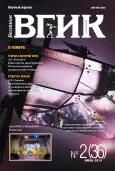Mind-Body Dialectics in the Latest Science Fiction TV-Series
- Authors: Stroyeva O.V1
-
Affiliations:
- Institute of Cinema and Television (GITR)
- Issue: Vol 10, No 2 (2018)
- Pages: 62-71
- Section: SCREEN CULTURE | CULTURAL STUDIES. PHILOSOPHY
- URL: https://journals.eco-vector.com/2074-0832/article/view/14578
- DOI: https://doi.org/10.17816/VGIK10262-71
- ID: 14578
Cite item
Full Text
Abstract
The article is devoted to the analysis of the latest science fiction series in the context of the mind-body philosophical problems. The synthesis of theoretical knowledge and empirical science (phenomenological, psychoanalytic, neurophysical and cybernetic experience) is used for the analysis. Prospects for the development of artificial intelligence, including the issue of creating self-conscious robots, unfold not only in science fiction but also in reality thus causing the high ratings of the cyberpunk genre. The destruction of the boundary between man and machine, natural and artificial body, physical and non-physical, real and virtual, is the key point of the newest series The Black Mirror, Electric Dreams of Philip K. Dick, Altered Carbon, Westworld. Mind-body dialectics in philosophy construed by R. Descartes and B. Spinoza, further developed by phenomenologists, is actualized today in the context of technological development. Despite the insights and warnings of science fiction writers, scientists seek for making the breakthrough in the invention of an “artificial man”. This tendency is caused, first of all, by the desire to conceive the arrangement of human consciousness: how it is generated by matter - the network of neurons of the brain. Solving this philosophical dilemma inevitably leads to unpredictable consequences and radical changes in the development of civilization. Nevertheless, this step is fatal in the general tendency of demiurgy and mimesis, which underlie all the cultural, creative and aesthetic activities of mankind. The author comes to the conclusion that cinema demonstrates models of the possible development of events and the consequences of technogenic tendencies, while the reality clearly indicates that the era of posthumanism has already begun, and we’re witnessing the most incredible scenarios created by the world of science fiction.
Keywords
Full Text
Abstract: The article is devoted to the analysis of the latest science fiction series in the context of the mind-body philosophical problems. The synthesis of theoretical knowledge and empirical science (phenomenological, psychoanalytic, neurophysical and cybernetic experience) is used for the analysis. Prospects for the development of artificial intelligence, including the issue of creating self-conscious robots, unfold not only in science fiction but also in reality thus causing the high ratings of the cyberpunk genre. The destruction of the boundary between man and machine, natural and artificial body, physical and non-physical, real and virtual, is the key point of the newest series The Black Mirror, Electric Dreams of Philip K. Dick, Altered Carbon, Westworld.
Mind-body dialectics in philosophy construed by R. Descartes and B. Spinoza, further developed by phenomenologists, is actualized today in the context of technological development. Despite the insights and warnings of science fiction writers, scientists seek for making the breakthrough in the invention of an “artificial man”. This tendency is caused, first of all, by the desire to conceive the arrangement of human consciousness: how it is generated by matter — the network of neurons of the brain. Solving this philosophical dilemma inevitably leads to unpredictable consequences and radical changes in the development of civilization. Nevertheless, this step is fatal in the general tendency of demiurge and mimesis, which underlie all the cultural, creative and aesthetic activities of mankind. The author comes to the conclusion that cinema demonstrates models of the possible development of events and the consequences of technogenic tendencies, while the reality clearly indicates that the era of posthumanism has already begun, and we’re witnessing the most incredible scenarios created by the world of science fiction.
About the authors
Olesya V Stroyeva
Institute of Cinema and Television (GITR)
Author for correspondence.
Email: olessia_75@mail.ru
PhD (Philosophy), Associate Professor, Full Professor of the Department of Theory and History of Culture, Institute of Cinema and Television (GITR).
Russian Federation, MoscowReferences
- Делез Ж., Гваттари Ф. Анти-Эдип. Капитализм и шизофрения. - Екатеринбург: У-Фактория, 2007. - 672 с.
- Делез Ж. Складка. Лейбниц и барокко / общ. ред. и послесл. В.А. Подороги. - М.: Логос, 1997. - 264 с.
- Карцев И. Жиль Делез. Введение в постмодернизм. - М.: ОГНИ ТД, 2003. - 232 с.
- Ницше Ф. Ecce Homo / Полное собр. соч.: в 13 т. Т. 6, 2009. - 408 с.
- Подорога В.А. Феноменология тела. - М.: Ad Marginem, 1995. - 344 с.
- Харауэй Д. Манифест киборгов // URL.: https://www.litmir.me/br/?b=598935&p=1 (дата обращения: 02.04.2018).
- Reggia J., Katz G. and Davis G. (2018). Humanoid Cognitive Robots ^at Learn by Imitating: Implications for Consciousness Studies // Frontiers in Robotics and AI. V. 5, Article 1. - P. 1-12.
- Sparrow T. Plastic bodies. Rebuilding Sensation after Phenomenology. - London: Open Humanity Space, 2015. - 292 p.
- Takeno J. (2013). Creation of a Conscious Robot. - Singapore: Pan Stanford. - 257 p.
Supplementary files







